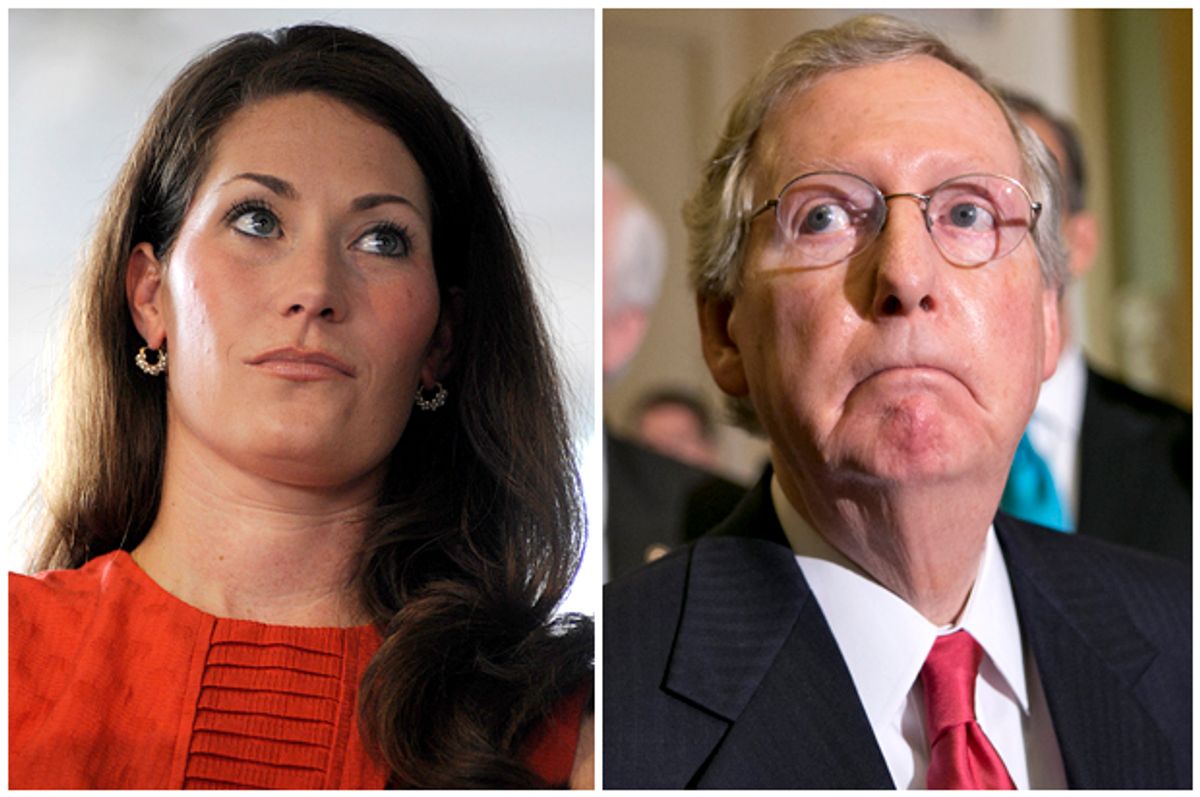Maybe it makes sense that Senate Minority Leader Mitch McConnell thinks sexism is dead. He’s essentially tied with Democratic challenger Alison Grimes in the polls, and Grimes just announced that she outraised him last quarter, bringing in $4 million to his $3.1 million -- although the longtime Senate veteran and courtier to the wealthy still has more cash on hand, with more than $8 million to Grimes’ $6.2 million.
McConnell probably never expected to have to work so hard to beat a younger female challenger. He may yet win; November is months away. But McConnell seems to be writing off most of the women’s vote and going hard after men with his latest foray into the world of gender politics.
As Mother Jones reported yesterday, McConnell told a group of Kentucky supporters last week that women don’t need help because “most of the barriers have been lowered.” He continued:
We've come a long way in pay equity, and there are a ton of women CEOs now running major companies…I don't grant the assumption that we need to sort of give preferential treatment to the majority of our population, which is, in my view, leading and performing.
McConnell is a little shaky on the facts, unless he considers 5 percent of Fortune 500 CEOs to be “a ton of women.” Women also make up a majority of adults in poverty, and two out of three minimum wage workers.
But McConnell doesn’t care about poor and struggling women. Republicans are battling for a share of the college-educated white women they need to narrow the gender gap (they’ll never close it as long as they support the policies they do), while going hard after the votes of white men. So he’s borrowing a page from Kentucky’s junior senator, Rand Paul, who went on the offensive – very offensive – earlier this year trying to fight notions that the GOP is waging a “war on women” on “Meet the Press.”
Paul told David Gregory that “if there was a war on women, I think they won.” His proof? “The women in my family are doing great.”
He went on:
I don’t see so much that women are downtrodden. I see women rising up and doing great things. In fact, I worry about our young men sometimes because I think the women are out-competing the men in our world.
Now here’s McConnell telling us that women, “the majority of our population,” are “leading and performing.”
Even Rep. Renee Ellmers, who was widely criticized (even by some Republicans) for advising her party to “bring it down to a woman’s level” when talking politics, took a similar tack in the same speech, at a conference of Republican women discussing the party’s messaging. She praised “many of our male colleagues” for doing “something that I think is very important: When we’re talking about the war on women – they are saying, you know ‘I have a wife, I have daughters, I have a mother, I have sisters – if there’s a war on women, I’m losing it.’”
Why are Republicans so enthralled by the narrative that if there’s a war on women, men are losing?
For one thing, they’re trying to woo successful women with flattery, to say, “Unlike the Democrats, we know you don’t need the government’s help!” Again, they’re only courting white college-educated women; they’re not trying to win over African-American women or Latinas, who experience even more poverty and pay inequity than white women.
But they’re also trying to reassure less successful men – particularly the white guys without a college degree who’ve become a pillar of the GOP base – that they understand that women have the upper hand.
This has actually been a staple of right-wing rhetoric going back to the wave election of 1980. The anti-feminist backlash of the ‘70s and '80s sometimes argued that the weaker sex needed more protection, and that those mean, angry feminists were going to send women into combat and make them use unisex bathrooms. But there was also a strong component of male self-pity in the backlash, and an attempt to harvest the votes of disaffected white working-class voters who were seeing their wages decline as the manufacturing base withered -- and blaming not corporate leaders but feminists.
With the unemployment rate over 11 percent in 1982, Ronald Reagan blamed joblessness on women taking work from men. “Part of the unemployment is not as much recession as it is the great increase of the people going into the job market and – ladies, I’m not picking on anyone but – because of the increase in women who are working today.”
In fact, the unemployment rate for men in 1982 was slightly higher than for women (it’s usually the opposite), but that was largely the result of women taking low-wage jobs, while men were losing higher-wage jobs. By 1984, the rate for women was back on top. During the latest recession and recovery, men and women have seesawed; right now the women’s rate is 5.9 while the male rate is 6.3.
So Republicans are playing an old tune here, though it’s updated for an environment when they know they have to be careful, because the votes of (white) women matter. Just today, McConnell urged Democrats to join him in supporting “The Preserving Religious Freedom and a Woman’s Access to Contraception Act,” the GOP’s latest political stunt. “We think that, instead of restricting Americans’ religious freedoms, Congress should instead work to preserve a woman’s ability to make contraceptive decisions for herself," he said.
Of course, that’s just a smoother way of making Mike Huckabee’s point: that Democrats are the party of women who “cannot control their libido or their reproductive system without the help of the government.” McConnell may think women are winning the “war on women,” but he also apparently thinks they’re stupid.



Shares